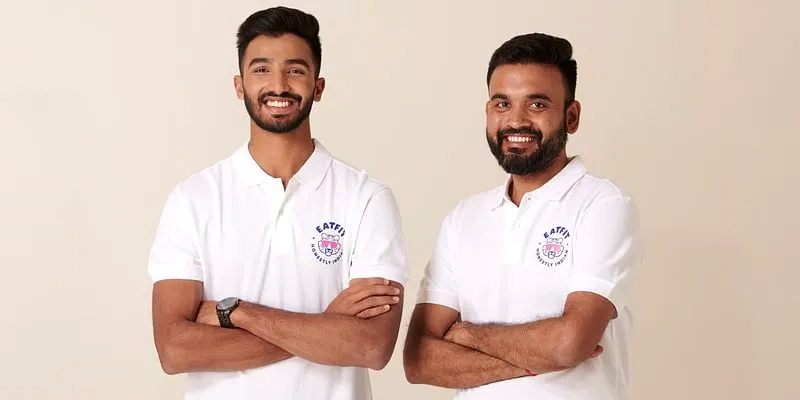Eat.fit’s Ankit Nagori eyes profitability by 2022-end
Cure.fit’s hived-off entity, Eat.fit, has signed up cricketer Devdutt Padikkal as brand ambassador and extended its menu beyond pure health food as part of plans to recover from the pandemic.
Health and fitness startup ’s hived-off entity, Eat.fit, has roped in Royal Challengers Bangalore cricketer Devdutt Padikkal as brand ambassador ahead of promotional campaigns for the Indian Premier League and aims to hit EBITDA profitability by 2022-end.
Cure.fit Co-founder Ankit Nagori, who runs Eat.fit, says the new vertical has been moving away from a pure health food play to a more youthful and “better for you” positioning as part of a recovery plan since the pandemic hit last year.

Devdutt Padikkal and Ankit Nagori
“The next six-eight weeks will see a very interesting campaign around the cricket season,” says Eat.fit business head Gokul Kandhi. “It will be a combination of match-time specific products, cool giveaways, and a lot of engaging content.”
Devdutt explains why he signed a four-year strategic brand partnership with Eat.fit. “Health and wellness will always be an important part of my journey. Staying fit physically and mentally is important for everyone, whether you’re a professional athlete or not, and this partnership gives me the opportunity to stand for a cause that I feel strongly about.”
Eat.fit was spun off from parent company Cure.fit in October last year. Since then it has been busy. The brand is working closely with the Bangalore Football Club (BFC) on nutrition and product development. Footballers Sunil Chhetri, Gurpreet Sandhu, and BFC fans came together to create a BFC line-up of products for EatFit.
The new entity is also collaborating with the Indian Railways and its tourism and catering unit to ensure every passenger is served high quality food on trains and at stations.
Lessons from the pandemic
Explaining the move to spin off Eat.fit, Ankit says it was driven by lessons learnt during the COVID-19 pandemic and the lockdown enforced last year.
“As with any other F&B (food and beverage) brand in the country, 2020 was a tough year for us,” he says. “At the peak of the pandemic, we were at 10 percent of pre-COVID order numbers. Now, however, we are seeing recovery and are at 30-35 percent of pre-pandemic numbers. We hope to get to 70 percent in 12-18 months.”
During the lockdown, the parent company observed that several customers were looking to eat out or order in only when they wanted a change or felt indulgent. Beyond nutrition, food had an emotional connect, the team found.
“We spoke to a lot of our customers and figured out the consumer behaviour and needs,” says Ankit. “In the beginning of 2021, we transitioned to this new brand and positioning. The new Eat.fit stands for honest and Indian food. We feel the addressable market for honest Indian food is a lot bigger than one for a pure health food play.”
The pandemic also necessitated the push for a high-calibre, lean team backed up by mechanisation and tech, says Ankit.
“Within our core team, most of the team members have been part of the Eat.fit business for several years,” he says. “Gokul, who leads our business, and Manasa Rajan, our food product head, have both been part of Eat.fit for over three years. Rahul Shankar and Dilip Verma, who lead design and operations, joined the team on Day One almost four years ago.”
The next target, Ankit says, is to make the business profitable in terms of earnings before interest, taxes, depreciation, and amortisation by 2022-end. “It is a very tough problem statement, but we have a strong team to back our ambitions.”
A similar yet differentiated menu
Gokul says that in the new avatar, “we want to evoke happiness while remaining true to our wholesome and health-focused roots. We have infused this into the product development DNA”. He cites Eat.fit’s kulcha burger as an example.
“We have taken a largely unhealthy category and redefined everything about it. Whole wheat kulchas, desi gravy, and all of this under 600 calories mean that an Indian burger is better than any big brand in the market.”
The new Eat.fit mantra will also be reflected in its product, packaging, and customer experience, he says.
Manasa explains the menu has two core themes: healthy, goal-oriented products that are subscription-led, and “better for you”, “entertainment” items.
“The newness comes from our exciting new products like the kulcha burgers, three-layered rice bowls, and biryanis curated especially for the young Indian, who experiments with food, enjoys a variety of cuisines, and is seeking a fun experience,” she says.
With subscription-led items such as salads, vegan meals, oatmeal bowls, and Indian meals, the focus is on ensuring customers meet their health goals, she says.
For this, the Eat.fit team keeps in mind the nutrition content and incorporates a variety of flavours through the week to avoid boredom. Some familiar Indian elements are infused into the menu too, such as mango-saffron in an oatmeal bowl, millet-cilantro in a salad, and new-age elements like a plant protein kofta in an Indian meal.
“It should also have important ingredients and superfoods that are relevant, like a simple gobhi aloo sabzi in an Indian meal, nutritionally dense broccoli or arugula in a salad, and chia seeds in an oatmeal bowl,” says Manasa.
In the entertainment eating/snacking section, the main items are biryanis, burgers, and creamy flavourful curries such as butter chicken.
Ride the trends
Asked about near-term trends in the cloud kitchen segment, Ankit says its recovery has likely reached 50-60 percent of pre-COVID volumes. A lot of the recovery will depend on offices resuming operations and migrants returning to cities, he says.
“A lot of the cloud kitchen volumes were driven by this demography,” he says. “While the next 12 months might have variability in demand, overall prospects for cloud kitchen businesses in the next five years look extremely promising.”
Following the pandemic, the F&B industry will see a further shift to online ordering, he says.
“Most of the brands will have to become digital first with a few experience centres. Eat.fit sits in the middle of all of this and has a huge opportunity to ride these mega trends in the coming years.”
On long-term F&B trends in the country, Ankit says Indian brands would break into the top 10 list currently dominated by US companies.
“It is surprising that no Indian brand has been able to create a standardised offering at a national scale,” he says. “In the coming decade we expect this to change. Many Indian brands, both in terms of origin and cuisine, will break into the top 10 national brands list.”
The other mega trend for the next decade would be the advent of healthy, clean label, better food, he says. For this, “brands will have to constantly reinvent their menus, ingredients, and processes to stay ahead of the curve”, says Ankit.
Edited by Lena Saha









